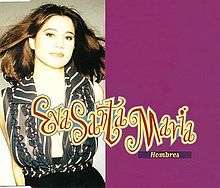Hombres (song)
 | |
| Cover of CD single | |
| Eurovision Song Contest 1993 entry | |
| Country | |
| Artist(s) | |
| Language | |
| Composer(s) |
Carlos Toro |
| Lyricist(s) |
Carlos Toro |
| Conductor |
Eduardo Leiva |
| Finals performance | |
| Final result |
11th |
| Final points |
58 |
| Appearance chronology | |
| ◄ "Todo esto es la música" (1992) | |
| "Ella no es ella" (1994) ► | |
"Hombres" (Spanish pronunciation: [ˈombɾes], "Men") is a song that was Spain's entry at the Eurovision Song Contest 1993, held in Millstreet, Republic of Ireland. It was sung by Eva Santamaría, who was chosen by the Spanish broadcaster, Televisión Española (TVE), as their representative in the Contest that year.[1]
Internal selection
From 1977 to 1999, TVE used an internal selection process to select both the singer and the song to represent them at Eurovision. For 1993, Eva Santamaría, a 22-year-old singer who had just finished recording her first album in Los Angeles, California, U.S.A., was selected to go to Millstreet with the lead song from her album, "Hombres," written and composed by journalist Carlos Toro.
At Eurovision
At Millstreet, the song was performed twenty-second on the night, following Croatia's Put with "Don't Ever Cry" and preceding Cyprus's Kyriakos Zymboulakis and Dimos van Beke with "Mi Stamatas". At the end of judging that evening, "Hombres" took the eleventh-place slot with 58 points.[2] No countries awarded Spain 12 points, the maximum score allotted to one country by another. Finland, however, deemed "Hombres" their second-favorite song of the evening and awarded Spain 10 points, Spain's highest allotment received from one country.
The song is sung from the point of view of a woman fed up with dating and men in general. Santamaría describes men as "selfish," "conceited," "vain," accusing them of confusing "machismo and masculinity," and lamenting that when they say "love," they mean "sex." However, she sings that when men are not around, "women feel lonely," and that men truly do make women happy, as they are as complementary as "war and peace...sun and moon...land and sea."
References
- ↑ "Spain in the Eurovision Song Contest 1993". EBU. Retrieved 2008-10-23.
- ↑ "Eurovision Song Contest 1993". EBU. Retrieved 2008-10-23.